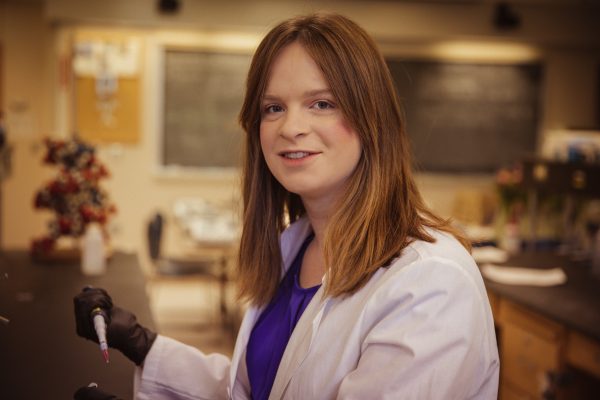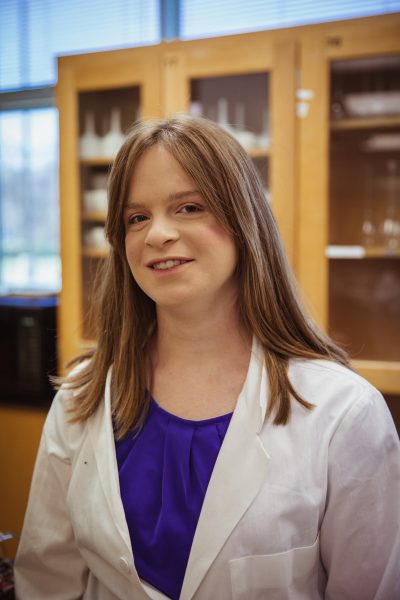Pre-med preparation
Author: Stacey Maifeld
Author: Stacey Maifeld

From an early age, Kathryn Wittrock (’23 biochemistry) was so passionate about science that she attended Iowa State’s Stupka Undergraduate Research Symposium twice while still in high school.
“The biochemistry faculty and staff told me how close the students were and that drove me to be able to picture myself here,” she said.
It turned out to be a perfect fit. Wittrock is now an Iowa State senior and an ISUAA Wallace E. Barron award recipient and will graduate this spring after completing her undergraduate degree in three years. She’s stayed busy with leadership roles in the Stupka Symposium, participating in student organizations like the Pre-Med Club and LAS Student Council, co-authoring a published research paper, and even studying abroad in Paris.
All her Iowa State experiences have prepared her for her dream since she was a teenager – becoming a physician.
As a teenager, Wittrock witnessed firsthand the diversity and complexity of medicine when her younger brother was hospitalized for two weeks with an autoimmune disease. His condition was so serious that he was temporarily paralyzed but thankfully recovered.
“During that time, I had the opportunity to see how physicians worked in teams and different specialties, such as neurology, infectious disease, and pediatric medicine, and how they intersected,” she said. “I also saw the different specialties in healthcare like nursing and physical therapy and the different stages that physicians were in, from medical students to residents to attending physicians. I decided that I wanted to be a physician, and I continued to grow my interest in medicine as I saw follow-up visits.”
Her choice of Iowa State was also personal. Wittrock’s family has a proud Cyclone history – someone in her direct family line has attended Iowa State every decade since 1920 – and it was close to home, making it a comfortable choice during her freshman year in the fall of 2020.
During her first semester on campus, Wittrock was eager to be involved in research, and she joined an Iowa State molecular virology and vaccine development laboratory headed by Michael Cho, professor of biomedical sciences in the College of Veterinary Medicine.
“We were working on second-generation COVID-19 vaccines,” she said. “Through that experience, I had the opportunity to do a lot of reading on the current COVID-19 research, and I worked hands-on in producing a possible vaccine.”
Only a freshman, Wittrock had a chance to be part of vaccine development firsthand, such as purifying a small portion of the spike protein on the virus and injecting it into mice to test for immune responses. She also received a first co-author credit on a review article about the research published in Frontiers and Immunology.

In another undergraduate research experience, Wittrock gained insights into what it might be like to work with her own patients one day when she assisted with a double-blind, placebo-controlled trial in a hemodynamics lab group in the Department of Kinesiology. Participants drank a daily protein shake for a week and then returned for a lengthy follow-up visit. Wittrock ran their tests – sometimes starting as early as 4:30 a.m. – and did preliminary blood draws to gather blood flow and nutrient absorption data.
“It’s super hands-on,” she said. “I enjoyed talking with participants, and it gave me better insight into patient care. A lot of medicine is keeping people calm during a procedure, and that was a cool experience.”
Wittrock has decided to attend the University of Iowa’s Carver College of Medicine. She said she appreciated Iowa State’s strengths in research in helping her prepare a competitive application, as well as opportunities like Pre-Med Club and the Pre-Health Conference.
“Being in a smaller pre-Med cohort allows you to have more connections because it’s more unique,” she said. “I found the support structure available here very helpful.”
Wittrock, who is interested in international medical missions, said she hopes to make a hands-on impact as a physician.
“I’m hoping to connect with each patient as an individual,” she said. “Medicine has recently started to recognize that there’s a lot more to a person than physical well-being and that can be connected to their circumstances of living and their mental and emotional state. I hope to recognize that my patients are going through very different circumstances and provide them with personalized care.”